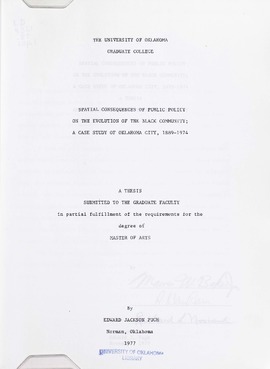| dc.contributor.advisor | Baker, Marvin | |
| dc.contributor.author | Pugh, Edward Jackson | |
| dc.date.accessioned | 2016-08-28T01:04:12Z | |
| dc.date.available | 2016-08-28T01:04:12Z | |
| dc.date.issued | 1977 | |
| dc.identifier.uri | https://hdl.handle.net/11244/45031 | |
| dc.description.abstract | Modern metropolitan centers and urban society in the United States are not only a cultural phenomenon of the twentieth century; they are the culmination of the past. At any point in time, the city's internal socio-spatial characteristics reflect a situation of the present which is largely dependent upon the past. What has gone on before in the formation and evolution of the socio-spatial structure of the city is not lost, but is engrained into its foundation; however altered through time. Often the magnitude and complexity of today's large North American metropolis overshadow the processes and events of the past, which intertwined together over time and space have evolved to a form with particular attributes characteristic of the contemporary modern city. | en_US |
| dc.language | en_US | en_US |
| dc.subject | African Americans – Oklahoma – Oklahoma City – Social conditions | |
| dc.subject | Minorities – Housing – Oklahoma – Oklahoma City | |
| dc.subject | Discrimination in housing – Oklahoma – Oklahoma City | |
| dc.subject | Urban geography – Oklahoma – Oklahoma City | |
| dc.title | SPATIAL CONSEQUENCES OF PUBLIC POLICY ON THE EVOLUTION OF THE BLACK COMMUNITY; A CASE STUDY OF OKLAHOMA CITY, 1889-1974 | en_US |
| dc.contributor.committeeMember | Nostrand, Richard | |
| dc.contributor.committeeMember | Hanham, Robert | |
| dc.date.manuscript | 1977 | |
| dc.thesis.degree | Master of Arts | en_US |
| dc.thesis.degreeDiscipline | Department of Geography | |
| ou.group | College of Arts and Sciences::Department of Geography | en_US |
